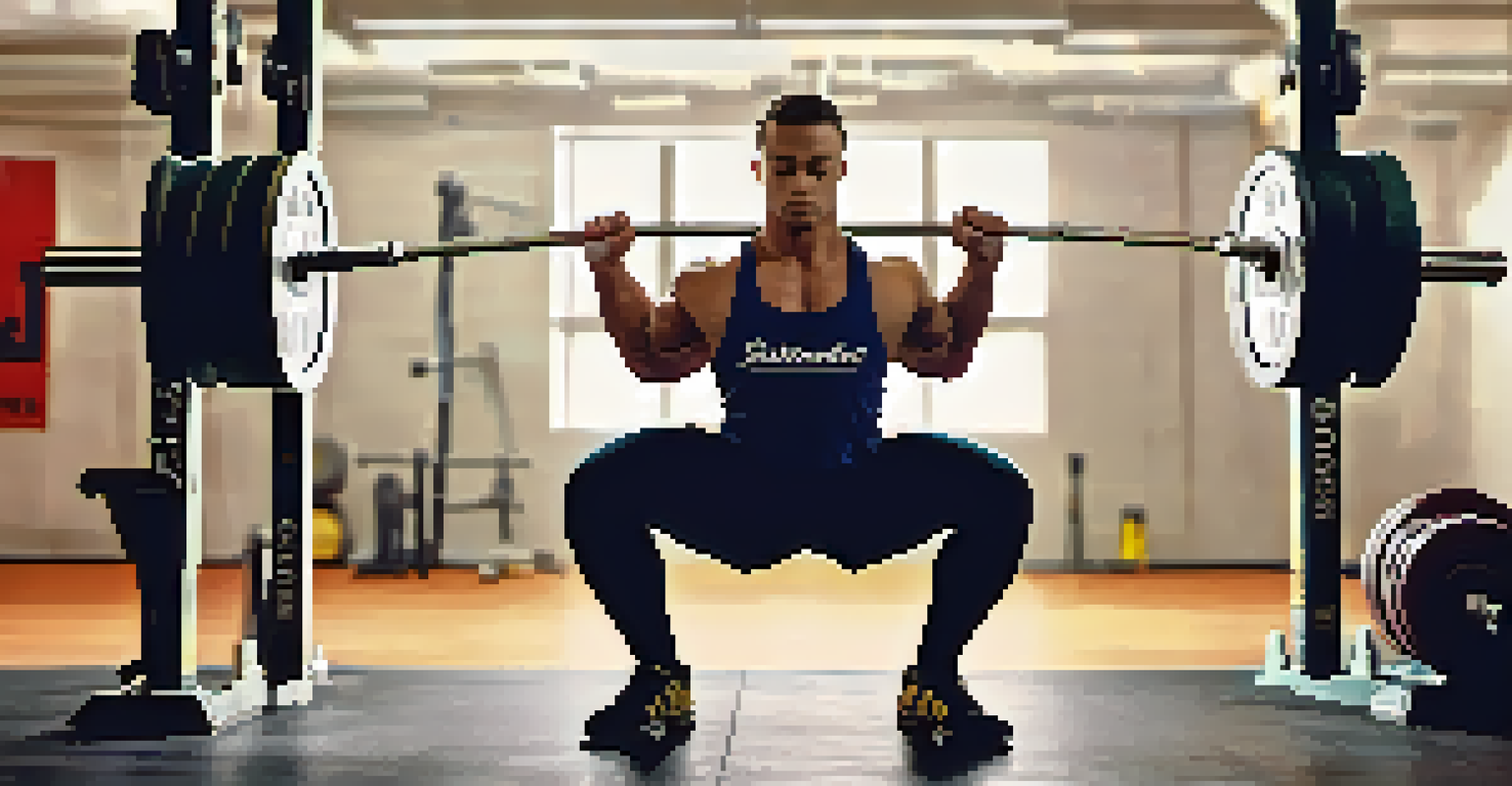Identifying Signs of Overtraining in Powerlifting Athletes

Understanding Overtraining: What It Is and Why It Matters
Overtraining occurs when athletes push their bodies beyond their limits without adequate rest and recovery. For powerlifters, this can mean lifting heavier weights too frequently, leading to physical and mental fatigue. Recognizing this condition is crucial because it can hinder performance and lead to injuries if left unaddressed.
The greatest weapon against stress is our ability to choose one thought over another.
Imagine your powerlifting progress as a delicate balance beam; too much weight on one side can tip you over. In this case, overtraining can affect not just your physical capabilities but also your mental resilience. It’s essential to maintain that balance to achieve your best lifts while staying healthy.
By understanding the nuances of overtraining, powerlifters can take proactive steps to monitor their training loads. Awareness of the signs can help prevent setbacks, ensuring that athletes continue to improve without compromising their well-being.
Recognizing Physical Symptoms of Overtraining
Physical symptoms of overtraining can manifest in various ways, from persistent soreness to decreased strength. If you find yourself struggling to lift weights that once felt manageable, that’s a red flag. Other signs might include frequent injuries, fatigue that lingers long after workouts, and disrupted sleep patterns.

Consider how your body feels during and after your training sessions. If you notice a consistent lack of energy or unusual soreness that doesn’t seem to fade, you may be pushing too hard. Just like a car needs regular maintenance to run smoothly, your body requires adequate rest to function optimally.
Overtraining Affects Performance
Pushing beyond limits without adequate rest can lead to physical and mental fatigue, hindering overall performance.
Listening to your body is crucial in this scenario. By acknowledging these physical symptoms early on, you can make adjustments to your training regimen, allowing for recovery and ultimately enhancing your performance in the long run.
Mental Indicators of Overtraining to Watch For
Mental fatigue is just as important as physical fatigue when it comes to overtraining in powerlifting. If you find your motivation waning or feel overwhelmed by your training routine, it’s time to assess your situation. Mental signs can include irritability, lack of focus, or a sudden disinterest in lifting altogether.
Take care to get what you like or you will be forced to like what you get.
Think of your mind as a powerful engine that drives your workouts; if it starts to sputter, your performance will inevitably suffer. Athletes often overlook mental health, but it plays a significant role in overall training success. Just like your muscles need rest, your mind benefits from breaks too.
By staying attuned to your mental state, you can prevent burnout and maintain a positive attitude towards your training. Emphasizing mental well-being can lead to more productive workouts and foster a love for the sport, enhancing your overall experience.
The Role of Sleep in Preventing Overtraining
Sleep is a crucial component of recovery and can significantly impact your performance as a powerlifter. When you skimp on sleep, your body doesn’t have the opportunity to repair and grow stronger. This lack of recovery can lead to an increased risk of overtraining, making it essential to prioritize quality sleep.
Think of sleep as the charging station for your body's battery. Without sufficient charge, you can’t expect to perform at your best. Establishing a regular sleep routine can help ensure you’re getting the restorative rest needed to support your training efforts.
Listen to Your Body's Signals
Recognizing signs of fatigue and soreness is crucial for making necessary adjustments to your training regimen.
By recognizing the importance of sleep, you can take steps to enhance your recovery process. This could mean setting a consistent bedtime, creating a restful environment, or even incorporating relaxation techniques to improve your overall sleep quality.
The Importance of a Balanced Training Program
A well-rounded training program is key to avoiding overtraining in powerlifting. This means incorporating not only strength training but also mobility work, cardiovascular exercise, and adequate rest days. Striking a balance between these elements helps ensure that your body remains resilient and adaptable to the demands of heavy lifting.
Imagine your training plan as a recipe; if you leave out a key ingredient, the final product won’t turn out as intended. Similarly, neglecting aspects like recovery and cross-training can lead to overtraining. Each component plays a vital role in your overall progress and well-being.
By diversifying your training routine, you can reduce the risk of overtraining while still achieving your lifting goals. This balanced approach not only enhances performance but also keeps your training enjoyable and sustainable in the long run.
Listening to Your Body: The Key to Recovery
One of the most effective strategies for preventing overtraining is to listen to your body. It often gives you hints about when you need to scale back or take a break. This could manifest as persistent fatigue, unusual soreness, or decreased performance during workouts.
Think of your body as a finely tuned instrument; if it’s out of tune, it won’t perform as expected. By paying attention to these signals, you can make informed decisions about your training. Ignoring these cues may lead to more significant issues down the line, including injuries.
Seek Professional Guidance
Consulting with coaches or trainers can provide valuable insights for effective recovery and prevent overtraining.
Developing a habit of self-assessment after each training session can enhance your awareness of your body’s needs. This practice empowers you to adjust your training plan accordingly, ensuring that you stay on track without risking overtraining.
When to Seek Professional Help for Overtraining
If you suspect that you’re experiencing signs of overtraining, it may be time to seek professional help. Coaches, trainers, or sports therapists can provide valuable insights on how to adjust your routine and recover effectively. They can also help identify any underlying issues that may be contributing to your fatigue or lack of progress.
Consider the experience of a seasoned powerlifter; even they sometimes need an expert's guidance to navigate tough training plateaus. This support can be crucial in developing a personalized recovery plan tailored to your specific needs. Remember, even the strongest athletes benefit from collaboration.

By reaching out for help, you can gain a fresh perspective on your training and recovery strategies. This proactive approach not only helps prevent overtraining but also fosters a healthier relationship with your sport, allowing you to continue pursuing your powerlifting goals.